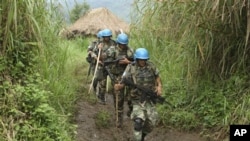Technology industry leaders in the United States say they welcome U.S. government efforts to regulate usage of the most common conflict minerals coming from Central Africa, but they say the law’s language is too vague.
Currently the law would require companies to disclose if any of four minerals in their products - gold, tantalum, tungsten and tin - came from Central Africa.
“We support it, and our proposal to Congress was a disclosure provision, a sunshine provision if you will, that was similar to the final provision,” said Rick Goss, vice president of Environment and Sustainability for the Information Technology Industry Council, a technology policy group in Washington.
Many cell phones and laptops are made with minerals that originate in the Democratic Republic of Congo and neighboring countries. Advocates of regulating conflict minerals say the mines are often controlled by militias and rebel groups that use the profits to perpetuate violence against the local population.
Though Goss’ clients support the law, its exact regulations and rules are still being set out by the U.S. Securities and Exchange Commission, and Goss added there are essential questions that have yet to be answered.
“Some of the language is a bit confusing, so we’re not exactly sure until we see a rule exactly how it will be interpreted and implemented,” he said. “A good example here is that the law as written would require companies to conduct due diligence and disclose whether anyone in their supply chain took part in activities that directly or indirectly benefited armed groups. One question is who will be designated as an illegal armed group for the purposes of this law?”
According to Goss, there are some members of Congress that want the Congolese military to be classified as an illegal armed group under the regulation, because of their participation in the illicit controlling of mines.
Beyond defining who is and is not an illegal armed group, there is also the question of how to define whether a U.S. company’s mineral purchases directly or indirectly benefits that group, added Goss.
Corinna Gilfillan, head of the United States office of Global Witness, said activists are trying to get companies and governments to cut off financing to armed groups.
But Gilfillan added the SEC’s process is already a year past its original deadline for setting regulation guidelines and said some companies are raising objections to the regulations and delaying its enforcement. “What’s really extremely concerning about this is that this provision is aimed at tackling an urgent human rights crisis,” she said.
The SEC has said they hope the process will be complete in the next few months.







